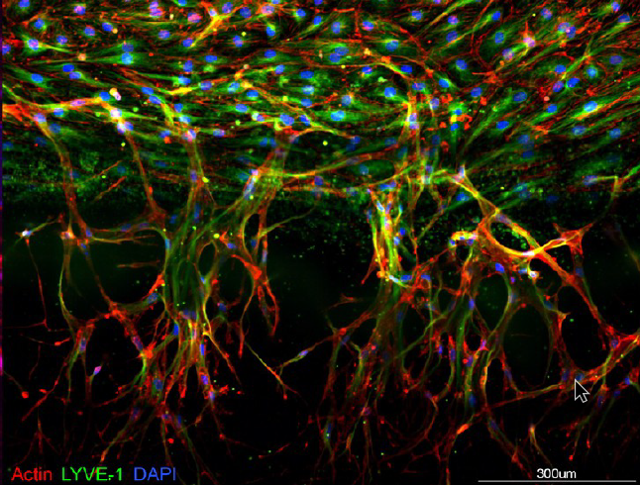Leiden, June 29, 2021 – Scientists from MIMETAS and the UMC Utrecht introduce a new organ-on-a-chip lymphatic vessel model together with a novel long-lived lymphatic cell line to study the lymphatic system in health and disease. This research has been published in ACS Biomaterials Science & Engineering.
Together with our cardiovascular system, the lymphatic system is crucial in maintaining fluid homeostasis. The lymphatic system facilitates the transport of immune cells to our lymph nodes and plays an important role in several pathologies. In cancer, the lymphatic system is far from static. The lymphatic vessels respond to a variety of tumor-secreted factors and start the growth of new lymphatic vessels, which is called lymphangiogenesis, and increase the flow drained from the tissue. This creates a thriving environment for the tumor which can now evade the immune system.
To study lymphatic biology, in vivo and 2D in vitro models are typically used. However, as in vivo models suffer from increased complexity and ethical issues, and two-dimensional in vitro models lack physiological relevance, new models are required. Organ-on-a-chip technology provides the necessary solution to these limitations. Two issues, however, limit the progress of these organ-on-a-chip models for lymphatic research. Firstly, primary lymphatic cells have a limited lifespan, making them unsuitable for 3D cell culture and screening. Secondly, current organ-on-a-chip models are of low throughput and therefore do not facilitate routine experimentation.
In this publication, a new lymphatic endothelial cell line is introduced with an elongated lifespan of over 12 months, with increased growth potential and decreased senescence. These cells were subsequently used to develop an organ-on-a-chip model in the high throughput MIMETAS OrganoPlate® 3-lane 40. The resulting 3D tissues presented as perfusable vessel-like structures grown against an extracellular matrix without any artificial membranes. Lymphangiogenesis could be observed by the addition of a gradient of lymphangiogenic factors. When co-cultured with mouse colon cancer organoids, the 3D tissue model resulted in a stable and long-lived system that can be used to study cancer-induced lymphangiogenesis and cancer cell motility.
